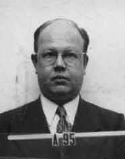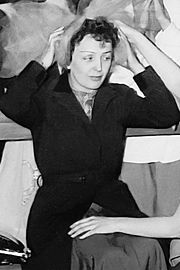Design
Design
Personality
Chart Properties
Your Cross represents the specific theme of your life. This cross embodies your unique potential & the lessons you're here to learn, providing a roadmap to fulfilling your life purpose.
We use the UTC birth time and date to do the calculations required to generate your Human Design chart.
Buy Tokens
Pay as you use, no expiry and no subscription required.Prompt Ideas
Get inspired with some epic prompt ideas.Norman Mailer's Biography
American novelist, journalist, poet, playwright, filmmaker, philosopher, lover and pugilist, considered a prodigious talent of the 20th century.
Mailer won the Pulitzer Prize for Literature for “Armies of the Night” in 1969 and “The Executioner’s Song” in 1979. In the ’50s and ’60s, Mailer commanded respect from his publishers, literary critics and readers all over the world. By the ’70s, he aroused much anger and controversy for baiting feminists, gays and people of color in public forums and in print. In the ’80s and ’90s, he had fallen out of fashion in the literary community.
Mailer was raised in a lower-middle class Jewish home. His father, Isaac Barnett Mailer, was an accountant who emigrated from South Africa to America via Great Britain. During the Great Depression, his father wandered around New York City looking for employment with his spats, walking cane and charming British accent. His mother, Fanny (Schneider) Mailer, supported the family by working as a secretary in a small fuel-oil business. Growing up in the household was rough for Norman and his sister Barbara. The family moved to Brooklyn when Norman was four. His parents fought hard in their stormy relationship. At an early age, Mailer became the apple of his parents’ eyes. His mother and family expected great things from him. Feeling the pressure, Mailer excelled at P.S. 161 and Boys High School.
Mailer loved airplanes and dreamed of becoming an aeronautical engineer. In 1939, at the age of 16, Mailer entered Harvard University. He began his studies as an engineering major but the lure of writing became too strong. He started writing scores of short stories during his freshman year in college. Graduating from Harvard with an engineering degree, Mailer was inducted into the U.S. Army in 1943 during WWII. He went to the Pacific and served as an infantryman in the Philippines until the end of the war. Mailer participated in the U.S. occupation of Japan.
In May 1946, he was discharged from the U.S. Army and resettled in New York City. In fifteen months, he finished his book “The Naked and The Dead,” published in 1948. The book was an immediate and critical success and Mailer began his fruitful writing career. Mailer’s political philosophy grew closer to socialism and communism in the late 1940s. He became a member of the Progressive Party but later wrote “Barbary Shore,” 1951, to air his disillusionment with Communism. In 1951, he moved to Greenwich Village in New York City and helped found the newspaper, “The Village Voice.” In 1953, Mailer began writing a column for the paper. “The Deer Park” was published in 1955 with little critical or commercial success. In the 1960s, Mailer wrote a monthly column for Esquire magazine. In need of money, he wrote a monthly serial in Esquire magazine called “An American Dream.” He wrote of the political climate in the late ’60s with “Why are We in Vietnam,” 1967 and “Miami and the Siege of Chicago” in 1968. His major acclaim occurred with the publication of “Armies of the Night” about his four-day anti-war protest in Washington D.C. He won the Pulitzer for non-fiction, Polk and National Book Award.
In June 1968, he ran an unsuccessful Democratic mayoral primary election campaign in New York City. In 1973, he wrote “Marilyn.” His portrait of Gary Gilmore in “The Executioner’s Song” earned him more critical acclaim and readers in 1979. Mailer went into films, acting in “Beyond the Law,” 1968 and directing “Tough Guys Don’t Dance” in 1987. In the ’90s, Mailer turned out “Harlots’ Ghost,” 1991 about the CIA, “Oswald’s Tale,” 1995 and “The Time of Our Time” in 1998.
In 1944, Mailer married his first wife, Beatrice Silvermen and they produced a daughter Susan. He left her in 1951 and moved to Greenwich Village to start his paper. He married his second wife, Adele Morales in 1954, and she bore him two daughters. On 19 November 1960, Mailer repeatedly stabbed Adele with a pen knife at the end of an all-night party in their Manhattan apartment. She was seriously injured, and he was committed to Bellevue for observation. The doctors diagnosed the writer with a nervous breakdown and he was given a suspended sentence. Mailer considered this event key to his life. They divorced in 1962. He married his third wife that year, Lady Jean Campbell, and they had a daughter Kate. He married his fourth wife in 1963 and they had two sons. In 1975, he met an actress at a friend’s home in Arkansas. He was so captivated by her beauty he had to leave the room. He married her in 1980 and Norris Mailer became his sixth wife, giving him his ninth child, John Buffalo, in 1978. Norris, raised as a Freewill Baptist, never swore and sparingly drank. Of his six wives, four were actresses. Of his nine children, five are actors or producers. Since 1957, Norman Mailer served on the Actors Studio board in New York City. He made his home in New York City and owned a Summer house on Cape Cod. The blue-eyed, white-haired stocky writer still stood with a massive neck and shoulders. He was a world champion talker who enjoyed expressing rapidly flowing sentences during his interviews.
In the 1950s, Mailer studied psychology and in 1959 he thought about becoming a psychoanalyst. It was at this time, Mailer experimented with orgone energy, peyote, mescaline, marijuana and “too much sex.”
On feminism, he said, “Women sold out to the corporation. It was a middle-class revolution.” On America: “Being American is like being married to a beautiful woman for 50 years and she gets worse and worse and worse-more selfish, stupid and benighted.”
On progress: “I detest architecture, plastic, frozen food, political correctness and blind acceptance of the women’s movement.”
The author died of acute renal failure in New York on 10 November 2007. He was 84.
Link to Wikipedia biography
Norman Mailer
Your Cross represents the specific theme of your life. This cross embodies your unique potential & the lessons you're here to learn, providing a roadmap to fulfilling your life purpose.
We use the UTC birth time and date to do the calculations required to generate your Human Design chart.








